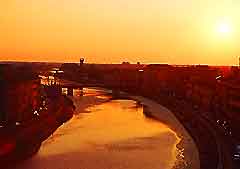Pisa Life and Travel Tips
(Pisa, Tuscany, Italy)
Pisa, Italy is one of Italy's great cities, most famous for the Leaning Tower of Pisa. The locals in this part of Tuscany are cheerful, friendly and generally very helpful. Good manners are welcome everywhere and expected by most people. Pisa is undeniably a city steeped in history and worth a visit, whatever the time of year.
Language
Most Italian words are pronounced exactly as they are written, syllable-by-syllable, and there is often an emphasis on the last letter. A knowledge of Latin can be useful, both as the basis for Italian and also for reading the inscriptions on many monuments.
Although Italian is the language of the land, English is generally understood and usually spoken to some degree at most Pisa attractions, museums, hotels and restaurants that cater to visitors. In smaller towns and villages nearby, a phrase book is a useful item to carry. Italians pronounce words exactly as they are written and so when speaking English, it may sound a little strange.
Places of Worship

The people of Pisa are very religious and enjoy going to church on a regular basis. There are a large number of churches in the city that welcome visitors and some even hold masses in English.
Smoking
In many buildings and public transport, rules restrict smoking and this is usually indicated by no-smoking symbols in prominent places. Most pubs and bars in Pisa welcome customers who wish to relax with a drink and smoke, as a high percentage of Italians are smokers.
It is always worth exercising discretion and sensitivity when selecting a place in which to smoke. The best advice would be not to smoke unless others around you do so.
Tips for Using the Euro
The Euro is made up of eight coins and seven paper notes and was introduced on January 1, 2002. The 12 members of the European Union - Austria, Belgium, Finland, France, Germany, Greece, Ireland, Italy, Luxembourg, Netherlands,
Portugal, and Spain - planned the event for more than a decade, determining a conversion rate for each country's national currency. The colourful Euro bills, which include holograms and shades of green, yellow, blue, mauve, and orange, are identical across the Euro area. Coins have one common and one national side, but they can be used in any of the member countries, regardless of the country of issue. Old currencies are no longer accepted, although they can still be converted to Euros in central banks.
Tipping
Tipping is quite discretionary, with taxi drivers usually being given a small gratuity. Restaurants in Pisa often include service charges and these are always clearly stated on the menus, although a small tip will still be expected. In Italy, even theatre and cinema usherettes expect a tip for showing you to your seat. Hotel staffs, such as luggage handlers, happily accept a small tip. Generally, no other public service workers in Pisa expect tips. You should always pay tips in cash, as this way you can be sure that the person it is intended for receives it fully.
Tourism and Tourist Information
Tel: +39 (0)50 560 464
The main tourism and tourist office in Pisa is situated just outside Porta Santa Maria on the west end of Campo dei Miracoli at Via C. Cammeo. It is open daily from 09:00 until 19:30 between May to October and until 17:30 between November to April. There is also a small Pisa tourist information office at the train station, with many useful maps, pamphlets and general Pisa tourism information. The APT tourist office is situated at Via Benedetto Croce and there is a helpful, private tourism consortium (supported by the state) that shares office space with the Via C. Cammelo tourist office.
Telephones and Emergency Numbers
- Emergencies - for police emergencies, dial 113, for fire dial 115
- The country code for Italy is 39 and the area code for Pisa is 05
- Telephone country codes: United States and Canada is 1, Australia 61, New Zealand 64 and for the United Kingdom 44 (the international prefix from Ireland is 00)
- For general directory and operator information in English, dial 176
- To place international telephone calls via an operator-assisted service, dial 170
Safety
The biggest threat in Pisa is by bag snatchers and pickpockets and thieves operate on foot and by moped. These thieves are very skilled, so be particularly careful with hand baggage. Wear a bag or camera across your body, or even use a concealed money belt. Also, ignore any illegal touts, who offer services such as arranging parking and finding hotels - although generally the city is free of con men.
Taxes
VAT (IVA) is always included in the price and refunds are unusual in Italy. Tourists from countries outside of the EU may claim a refund on this tax if the item was purchased for personal use and cost more than a certain amount. Ask the shopkeeper for details.
 The people of Pisa are very religious and enjoy going to church on a regular basis. There are a large number of churches in the city that welcome visitors and some even hold masses in English.
The people of Pisa are very religious and enjoy going to church on a regular basis. There are a large number of churches in the city that welcome visitors and some even hold masses in English.